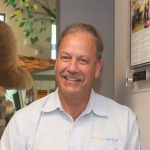Alumni Profile: Dr. Thomas Kellogg – comprehensive general dentistry and constant community service12 min read
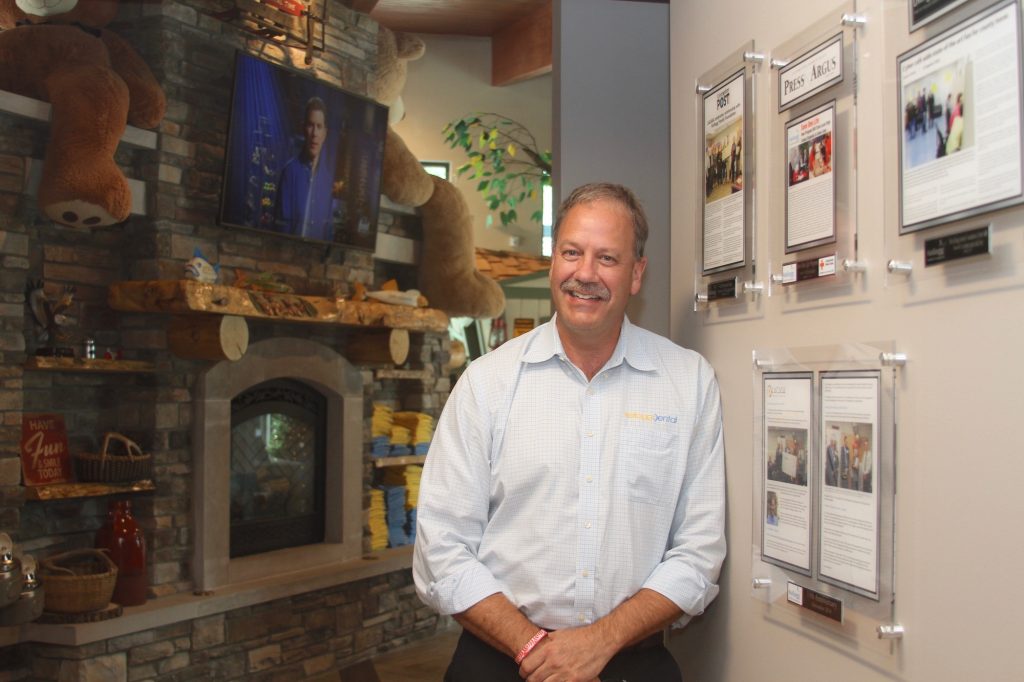
This profile is one in a series highlighting School of Dentistry alumni, donors and students.
Thomas Kellogg learned as a boy growing up in Howell, Mich., that even a dentist’s son can fear the dentist. It’s a childhood story that has influenced and informed the way he has operated his dental practice over the last 36 years.
When he fell and broke a tooth in elementary school, his classmates were full of doom and gloom about what would happen at the dentist. Even his teacher, who knew his father was a dentist, added to the dread he felt about what might happen in the dental chair. So he didn’t tell his parents. Eventually his mother found out and rushed him to his father’s office.
He remembers it this way: “My father and his assistant met me at the door. They took the time to sit beside me and calm my fears. They made me feel at home. I knew they would listen to me and really cared. The procedure went by quickly and easily. My problem was easily repaired and I got great care. I knew I was in capable hands and redeveloped my confidence in going to the dentist. The treatment I received left a lifelong impact and I knew that the Kellogg Dental experience was different than what everybody talked about. It was at this point in my life that I knew I wanted to someday own a practice that focused on overdelivering and giving patients an experience that would make dentistry fun, comfortable and easy for everyone just like my dad did for me that day.”
Since graduating from the University of Michigan School of Dentistry in 1983, Kellogg has had two basic goals for the practice he built in his hometown. The first is to provide his patients with excellent, comprehensive treatment options by expanding his knowledge through regular hands-on training and lifelong learning. The second is to have a practice that is welcoming, fun and comfortable for his patients whether they are 2 years old or 102.
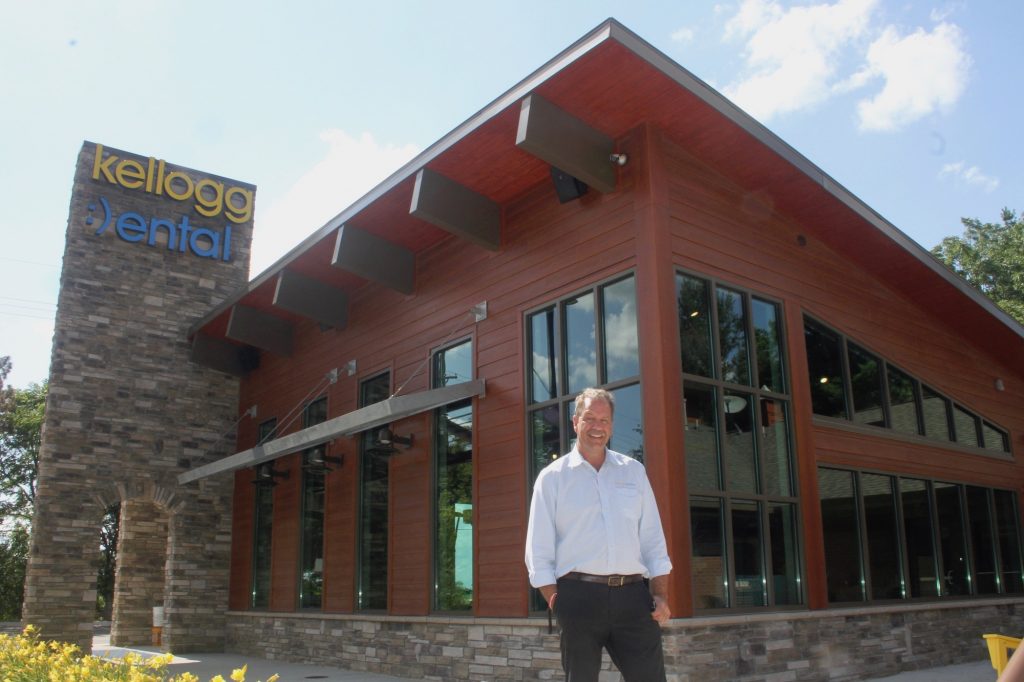
His philosophy has been so successful that Kellogg recently completed a beautiful new addition that doubled the size of Kellogg Dental. The expansion comes at a time in his career when the temptation would be to coast toward retirement, but Kellogg has no interest in slowing down. He and his staff of 30 now have 20 dental chairs to accommodate patients requiring all types of general dentistry care, from basic cleanings and fillings to sophisticated prosthodontics and root canals. The new addition’s large, airy entrance area, with floor-to-ceiling windows, feels more like the great room of a resort than a waiting room in a dentist’s office. A large stone fireplace with a hand-carved, wooden mantel gives off an “Up North” feel. A “Camp Kellogg” play area that looks like a treehouse on stilts and several huge teddy bears positioned randomly around the room make it kid-friendly as well. It’s a great spot for the ice cream socials, Halloween parties and live music the practice hosts for patients.
For staff, Kellogg pairs the welcoming atmosphere of the place with a significant amount of time allocated for staff training, bonding and life skills development. The staff starts each day with a meeting; it’s 15 minutes four days a week and an hour the other day. Kellogg said it’s important that he and the staff create a positive culture. They view the office as a “bubble” where they leave their outside concerns behind and focus on making the patient experience exceptional. They regularly engage in discussions about the keys to success and happiness using motivational books and videos. “My goal in life is to grow people,” he says.
The large-group dynamic is not something he learned from his father, who chose to spend nearly his entire career working alone. Kellogg said his father, Edward M. Kellogg, had only two assistants over the years – one lasted two years and the other only a week. His father preferred to serve as his own dental hygienist, bookkeeper and billing staff. When Thomas returned to Howell after dental school, they practiced in the same building but not in the same office. Thomas came out of dental school with a new generation of methods, materials and ideas, which would regularly prompt his father to ask, with a bit of undisguised disapproval, “Why are you doing that?” Edward’s counsel was to use tried-and-true methods, become really good at the basics and keep the practice simple. Over time, Thomas came to believe in the same school of thought. “I found that how I do dentistry is more bricks-and-mortar,” he says. “I’ve done all the wild and crazy stuff and when it comes down to it, it’s about the basics, things that are tried and true, things that last.”
Kellogg credits his time at the U-M dental school with preparing him for the myriad and difficult problems a dentist will encounter during a career. “It was very grueling, very demanding,” he says of dental school “This was not an 8-4 thing. It was 5:30 in the morning until 11 at night. When we got done with classes at 4:30, you ran home and got food and then you were in the lab all night. We had a lab in the basement of the Delta Sigma Delta fraternity. We were studying and cramming for exams. Really, there was no free time. At the time I thought it was bad, but it prepares you for life. Since then, I’ve been through a lot of things and I credit a lot of the resilience – and I like the word resilience – to what I was trained to go through then. You learned real fast that you were on your own. You either performed or …”
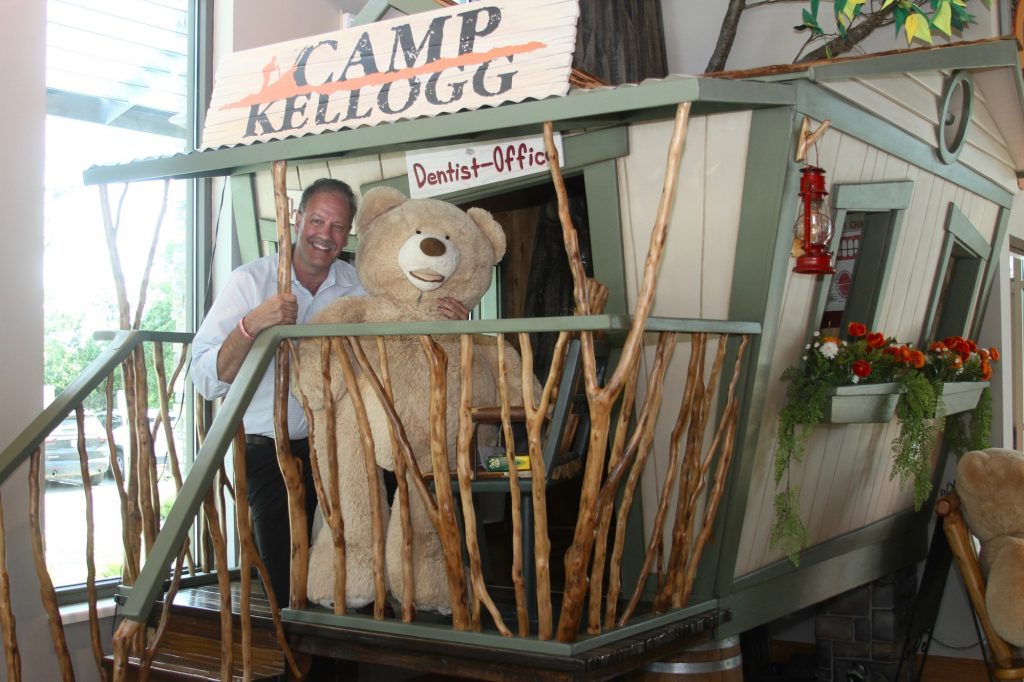
Kellogg sought out specialty training in the first years after graduating, completing university-level programs at Ohio State, Washington and Minnesota, along with many other hands-on courses over the years. He was an adjunct faculty member at U-M for a year, in what was then the crown and bridge clinic. He’s a fellow and member of numerous professional dental academies and organizations. These days, complex restorative care gives him the most satisfaction. “Looking at the whole person and the whole mouth is what I do. I don’t treat one tooth at a time, ever,” he said. “I just really fuss over the details. Everything I was taught in dental school, about taper and all that, we do it. Materials can’t make up for not paying attention. My work is solid, high-quality, bullet-proof. I want my patients to be proud that they come here.”
Kellogg’s choice of healthcare as a profession follows a family tradition that started with his great-grandfather, John Harvey Kellogg, a world-renowned doctor who ran the famous Battle Creek Sanitarium, a health resort that treated thousands of people from the late 1800s through the 1940s. John Harvey Kellogg was a prolific researcher, inventor and author who was decades ahead of his time in promoting progressive health reform that focused on eating healthy foods and exercising. He was also the inventor of corn flakes, though it was his younger brother, W.K. Kellogg, who turned the breakfast cereal into the Kellogg Company, which became one of the largest food companies in the world.
John Harvey Kellogg’s son Richard M. Kellogg (Thomas’s grandfather) graduated from the U-M School of Dentistry in 1916 and practiced at the Sanitarium in Battle Creek. Richard M. Kellogg’s son, Edward M. Kellogg, followed his father to the U-M dental school, but had to leave school for treatment of tuberculosis. When Edward recovered, U-M would not re-admit him, so he earned his DDS at what was then the University of Detroit. Thomas Kellogg said his father continued to admire the U-M dental school and treated it with reverence during the four years Thomas was there.
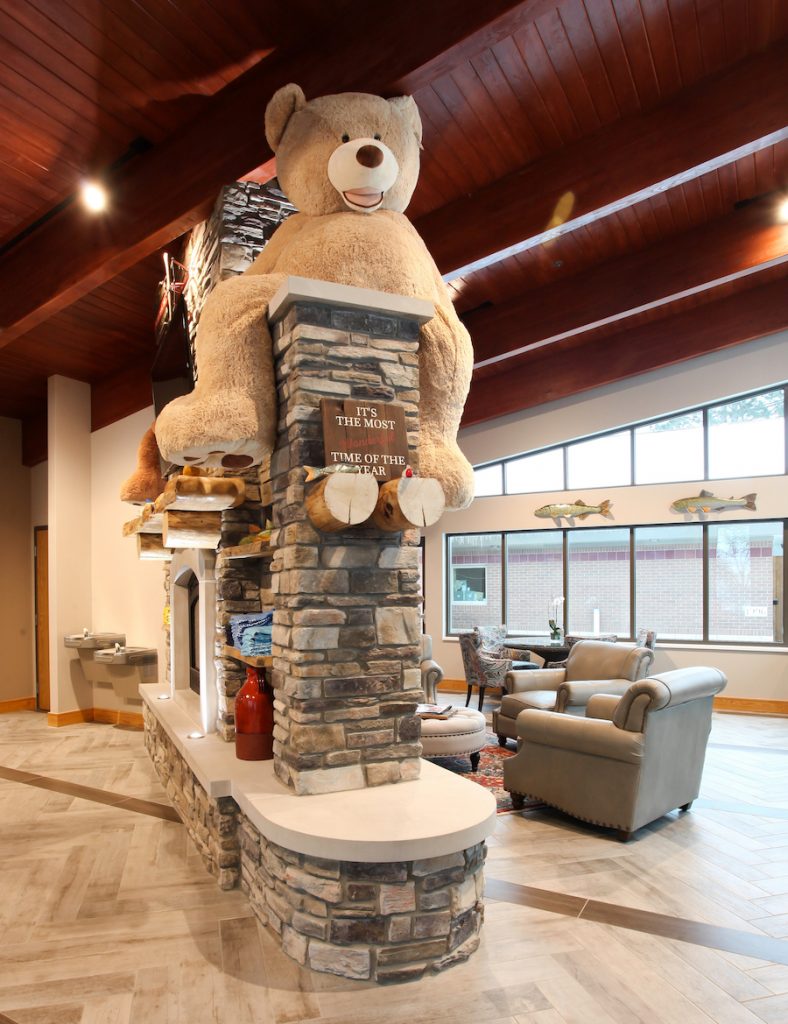
After he earned his DDS degree in 1983, Thomas Kellogg could have pursued dentistry in many places, but he chose to return to his hometown. It was the place where he had played Little League baseball and went camping with his buddies in Boy Scout Troop 363, becoming an Eagle Scout and receiving the National Outstanding Eagle Scout Award along the way. It was where his parents taught him about the importance and satisfaction of community service, although he says he hated most every minute of the tagging along on their never-ending weekend projects when he would have preferred to be with his friends. As he thought about where to put his DDS into practice, he discovered that he had enjoyed growing up in Howell and he decided it would be a good place to raise his own family. “I’ve always had this sense that I owed something back because I grew up here. I went to school here. I guess it’s a sense of gratitude and loyalty to come back. Plus, it was comfortable. It just worked out great.”
His devotion to his hometown and community service is documented by a long and impressive list of organizations and events that have benefitted from both financial contributions and time donated by Kellogg, his family and his staff. The significant breadth and depth of his community involvement has remained constant for more than 30 years. He has for many years hosted a Free Dental Day where he and his staff provide treatment for Howell-area residents who cannot afford dental care, and he has led dental missions to treat the underserved in Honduras, the Dominican Republic and Guatemala, among other international locations.
The Kellogg Family Foundation started by his parents is a major benefactor of LACASA, a nonprofit organization in Livingston County that provides free support to those who have experienced child abuse, domestic violence and sexual assault, along with community awareness and educational programs. The Foundation, for which Thomas Kellogg is a trustee, also sponsors Camp Kellogg, a Boy Scout camp for underprivileged youth in Kalkaska, Mich. The foundation has worked closely with the Red Cross on many projects, including a partnership to create “Save One Life,” a pilot program providing CPR, first aid and AED training for 10,000 students, teachers and coaches in Livingston County that was later used nationally. Support has been provided for programs supporting niches as diverse as teens, people with autism, recycling and the Howell Carnegie Library Clock project.
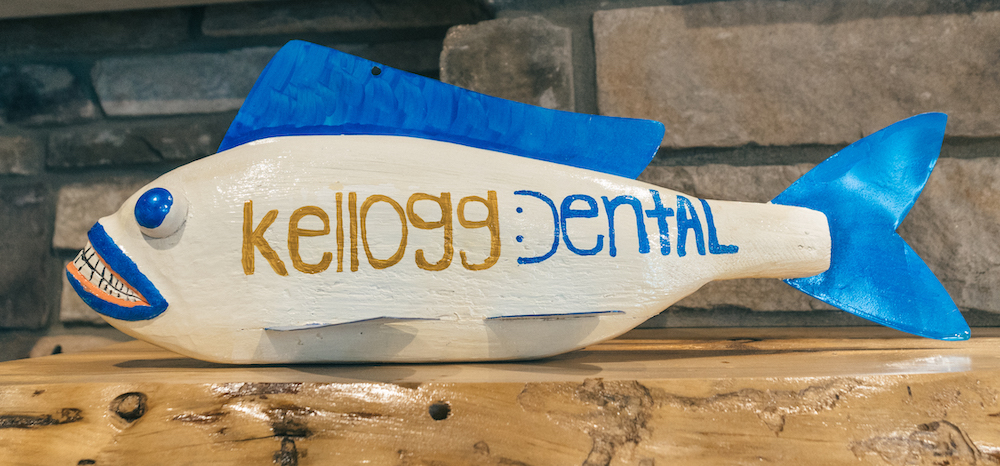
Kellogg Dental raised more than $45,000 to renovate the Livingston County Veterans Memorial and it contributes to Operation Gratitude, an organization that supports U.S. military personnel overseas. The dental practice visits schools to talk about oral health, holds canned food drives, hosts Red Cross blood drives and collects socks for foster kids, among other initiatives. This philanthropy and volunteerism has prompted local, state and national recognition, including the Boy Scouts of America National Distinguished Citizen Award.
In the last couple of years, Kellogg has been working on what might be called a Founder’s Statement, a written description of what’s important to him as a person and as the leader of a successful business. He’s been musing about the things he would like to impart to the next generation. The core focus all comes back to stewardship and gratitude, about putting time and energy into growing people and taking care of all of our valuable resources
Much of his message is emphasizing the importance of community service. It’s what he learned from his parents and what he has tried to pass along to his son and two daughters. “Community service is not optional. Giving back is mandatory,” Kellogg said. “We are always working on something. When we’ve got one project almost done, we’re starting on another. It’s central to my personal core values. If I’m not doing that, I’m not being a very good example for my team and for my family.”
“It has very little to do with dentistry,” he said. “It’s more about how we care for people.”
###
The University of Michigan School of Dentistry is one of the nation’s leading dental schools engaged in oral health care education, research, patient care and community service. General dental care clinics and specialty clinics providing advanced treatment enable the school to offer dental services and programs to patients throughout Michigan. Classroom and clinic instruction prepare future dentists, dental specialists and dental hygienists for practice in private offices, hospitals, academia and public agencies. Research seeks to discover and apply new knowledge that can help patients worldwide. For more information about the School of Dentistry, visit us on the Web at: www.dent.umich.edu. Contact: Lynn Monson, associate director of communications, at [email protected],or (734) 615-1971.

